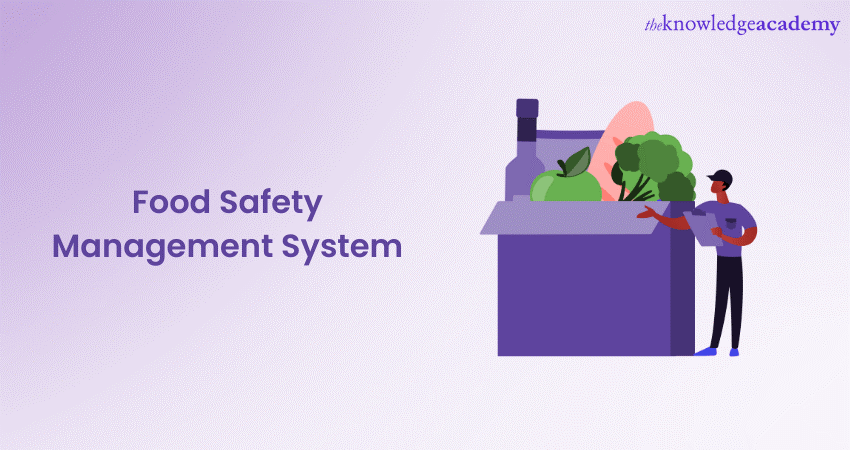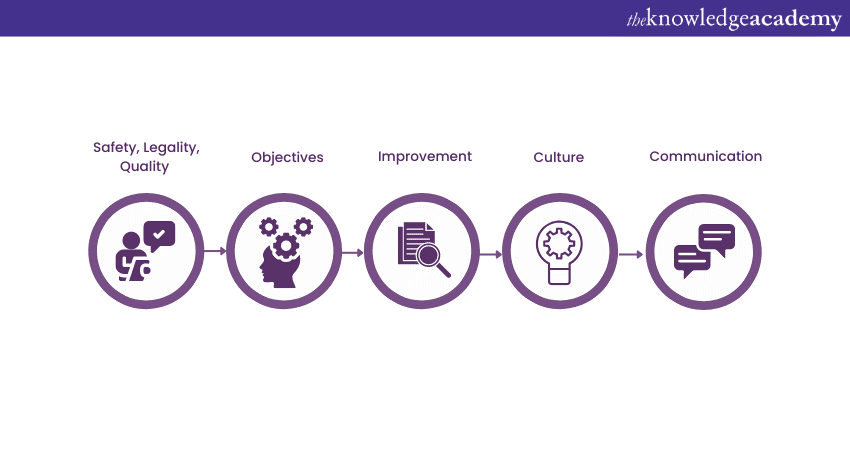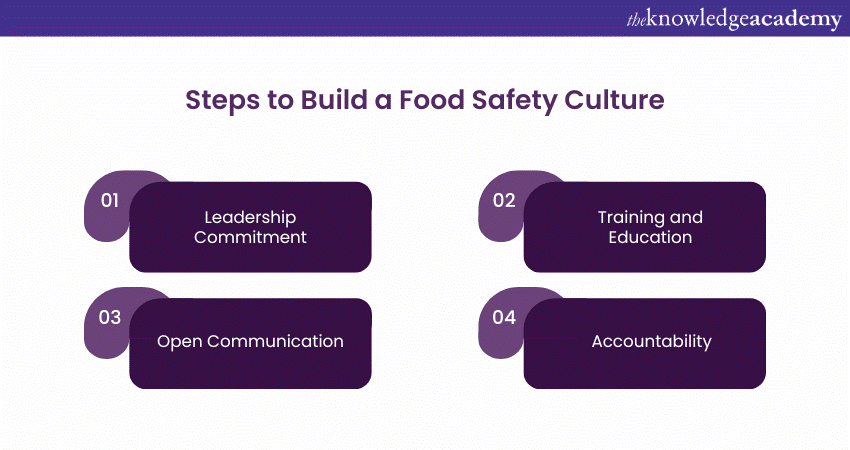We may not have the course you’re looking for. If you enquire or give us a call on + 1-866 272 8822 and speak to our training experts, we may still be able to help with your training requirements.
We ensure quality, budget-alignment, and timely delivery by our expert instructors.

Guaranteeing the safety of the food we consume is paramount. But how can businesses guarantee that their food products are safe for consumers? This is where a Food Safety Management System (FSMS) comes into play. This is mostly a comprehensive approach that helps organisations control Food Safety hazards and ensure that food is safe to eat.
But ever wondered what steps are involved in maintaining Food Safety from farm to fork? Or how businesses can prevent foodborne illnesses and comply with regulatory requirements? This complete blog will delve into the essential components of an Food Safety Management System, the benefits it offers, and the best practices for implementation. Dive in to explore further!
Table of Contents
1) What is a Food Safety Management System?
2) Why is a Food Safety Management System Important?
3) Key Elements of FSMS
4) Steps Involved in a Food Management System
5) Safety Culture for Food Safety Management
6) Conclusion
What is a Food Safety Management System?
This process involves each and every step, from supplying delivery to shipping out the finished goods. This ensures that there is a defined process for each and every function. It helps the food business organisations to win the trust of their consumers as well as serve them efficiently. International organisations like Hazard Analysis and Critical Control Point (HACCP) Food Safety System Certification FSSC 22000 offer FSMS.
Why is a Food Safety Management System important?
An FSMS is a necessity for manufacturers working in the food industry so that they can prove that they are compliant with Food Safety legislation and are produce safe-to-consume products. FSMS is required for the following regulations and laws:
a) ISO 22000
b) BRC Global Standard
c) The Food Safety Act 1990 (UK)
Here's why FSMS is important:
a) An FSMS ensures food is free from anything that might make someone sick. This keeps your customers safe and coming back for more.
b) Food Safety Laws exist to protect everyone. An FSMS helps businesses follow these rules and avoid fines or even getting shut down.
c) Customers trust businesses that take Food Safety seriously. An FSMS shows you care about quality and puts your brand ahead of the competition.
d) By identifying potential problems early on, an FSMS minimises the chances of food recalls or lawsuits. It's like preventing accidents before they happen.
e) An FSMS helps streamline food production and distribution. This saves money, reduces waste, and makes your business run more efficiently.
f) International Food Safety standards can open doors to new markets. An FSMS shows you meet global quality expectations.
g) People want to know their food is safe. An FSMS builds trust with your customers, giving them peace of mind when they choose your products.
Take control of Food Safety with our comprehensive Food Safety and Hygiene Course and ensure compliance with industry standards.
What is the purpose of a Food Safety Management System?
The main goal of a Food Safety Management System (FSMS) is to keep food safe and prevent people from getting sick. It acts like a roadmap for food businesses, ensuring all the steps involved in handling food are taken correctly. Here's how an FSMS achieves this:
a) It identifies potential dangers like bacteria or contamination at every stage, from farm to table.
b) By pinpointing these hazards, the FSMS helps businesses take steps to minimise the chance of foodborne illnesses.
c) Ultimately, the FSMS ensures safe, high-quality food reaches consumers, keeping them healthy and building trust in your business.
d) The FSMS also provides clear instructions for food handlers, outlining proper hygiene practices and procedures. This ensures everyone is on the same page regarding Food Safety.
Equip yourself to lead Food Safety efforts with our Food Safety Manager Training and ensure a safe and compliant food handling environment.
Key Elements of FSMS
The following comprise of the key elements of a Food Safety Management System:
1) Interactive Communication
Good communication is critical to safe food! While you might not know everyone involved in getting food to your table, it's crucial to connect with two key partners:
a) Suppliers: These are the folks who provide your ingredients. Understanding their Food Safety practices helps ensure quality from the start.
b) Customers: Whether it's a restaurant or a grocery store, these are the people you sell your food to. Knowing their needs and expectations regarding Food Safety is essential.
By keeping these two groups informed and considering their input on Food Safety, you can build trust and ensure everyone enjoys delicious, safe food.
2) System Management
Keeping your Food Safety Management System running smoothly is like maintaining a well-oiled machine. Food businesses can choose their own methods, but following ISO's recommended approach is a great option. Here's how ISO helps:
a) Always prioritise your customers' safety and satisfaction by ensuring top-notch Food Safety practices.
b) Management sets the tone for Food Safety. Clear direction and commitment from the top are essential.
c) Engage everyone involved in the process. A Food Safety-conscious team is a winning team.
d) Think of each step in food handling as a vital cog in the machine. Ensure each step is done correctly.
e) Never settle! Regularly review and improve your FSMS to stay ahead of potential risks.
f) Base your decisions on facts and observations, not guesswork. This ensures your FSMS remains effective.
Strong communication with suppliers and customers fosters trust and collaboration, leading to a safer food chain for everyone.
3) Prerequisite Programs
Imagine the building blocks for a safe and delicious meal. Prerequisite programs are essential building blocks in Food Safety. The International Organisation for Standardisation (ISO) standard defines them as the primary conditions and activities a food business must have throughout the complete food chain. Here are some key examples of these prerequisite programs:
a) Good Manufacturing Practices (GMP): These are the golden rules for food processing facilities, ensuring a clean and sanitary environment for preparing and handling food.
b) Good Agricultural Practices (GAP): These focus on safe food production from the start, covering practices on farms like proper crop and livestock handling.
c) Good Hygienic Practices (GHP): These are the personal hygiene guidelines for everyone handling food, from washing hands properly to wearing appropriate clothing.
Enhance your professional credentials with our Food Safety Manager Training – register today and make a difference in the food industry!
Steps involved in a Food Management System
Let’s take a look at the steps involved in FSMS:
1) Identify Scope, Needs and the Objective
If you are about to start an FSMS, you need to ask certain questions to yourself. For instance, Why do you need a Food Management System? No organisation can be perfect, and it is likely that food business organisations have already identified issues or flaws affecting their operation.
These areas of improvement are helpful as they can help the FBO structure the FSMS. By crafting solutions to the issues which have been identified, you are setting the FSMS for success. After enlisting three to five problems, the FBO is supposed to think of a goal that would help them address and minimise the impact of these problems.
2) Establish a Food Safety Policy
A food business will reach the FSMS objectives by having a Food Safety policy. Outlining the management structure would enable the food business to go ahead with changing or improving food safety practices. Some best practices for Food Safety include the following:

3) Follow Prerequisite Programs
Food business operators will need to create a standard operating procedure as well as conduct GMP audits carefully. For the GAP prerequisite program, the FBO will need to browse their site history to identify risks of contamination and monitor the handling and storage of produce.
4) Measure the Effectiveness
Although food business operators are mostly active in the maintenance of the Food Safety Management System, this does not mean that it cannot be changed. Like any other system, the FSMS is to be continually reviewed and improved accordingly.
Protect your customers and enhance your reputation with our Food Allergy Awareness Training – join us now!
3) Develop a Hazard Control Plan
For each food product released, the Food Business Operator (FBO) must develop a comprehensive hazard control plan. This plan should detail the food product, including its raw materials, ingredients, and contact materials. It should identify the intended consumers, especially if the food meets specific nutritional needs or targets vulnerable groups.
The plan must outline the processes involved in the preparation, production, and distribution of the food, along with the associated hazards and risks. It should establish critical limits and acceptable levels for these hazards, specify actions to be taken if these limits are exceeded, and include control measures to prevent further hazards and maintain acceptable levels.
Safety Culture for Food Safety Management
A strong safety culture is the backbone of an effective Food Safety Management System (FSMS). It includes fostering an environment where every employee, from top management to frontline workers, prioritises Food Safety in their daily activities. Let’s now talk about what it takes to build such a culture:

1) Leaders should demonstrate a genuine commitment to Food Safety, setting the tone for the entire organisation.
2) Continuous training ensures that all employees know the Food Safety protocols and understand their role in maintaining them.
3) Encouraging open dialogue about Food Safety issues helps identify potential risks and fosters a proactive approach to problem-solving.
4) Establishing clear responsibilities and holding everyone accountable ensures that Food Safety practices are consistently followed.
Conclusion
Like every industry needs a check, so does the Food Safety Management System. While petty manufacturers might ignore this process, it is important to know that safety is and is supposed to be independent of the size and the type of business. Its implementation can help in ensuring the involvement of top management.
Create a lasting impact on Food Safety by joining our Building Your Food Safety Culture Training – secure your spot now!
Frequently Asked Questions
What are the key Roles in Managing a Food Safety Management System?

Key roles in managing a Food Safety Management System include the following:
a) Food Safety Manager: Responsible for overall system implementation and compliance
b) Quality Assurance personnel: Ensure adherence to standards
c) Food Safety Team members: involved in day-to-day monitoring and implementation of safety protocols.
What is the Demand for Professionals With Expertise in Food Safety Management?

Professionals with expertise in Food Safety Management are in high demand because of increasing regulatory requirements, consumer awareness, and globalisation of food supply chains. Industries such as food manufacturing, retail, hospitality, and healthcare seek qualified professionals to ensure compliance and maintain consumer trust.
What are the Other Resources and Offers Provided by The Knowledge Academy?

The Knowledge Academy takes global learning to new heights, offering over 30,000 online courses across 490+ locations in 220 countries. This expansive reach ensures accessibility and convenience for learners worldwide.
Alongside our diverse Online Course Catalogue, encompassing 17 major categories, we go the extra mile by providing a plethora of free educational Online Resources like News updates, Blogs, videos, webinars, and interview questions. Tailoring learning experiences further, professionals can maximise value with customisable Course Bundles of TKA.
What is The Knowledge Pass, and How Does it Work?

The Knowledge Academy’s Knowledge Pass, a prepaid voucher, adds another layer of flexibility, allowing course bookings over a 12-month period. Join us on a journey where education knows no bounds.
What are Related Courses and Blogs Provided by The Knowledge Academy?

The Knowledge Academy offers various Food Hygiene and Safety Courses, including Food Safety and Hygiene Course, Food Hygiene and Safety in Manufacturing Training, and Food Allergy Awareness Training. These courses cater to different skill levels, providing comprehensive insights into Food Safety.
Our Health & Safety Blogs cover a range of topics related to Food and Safety, offering valuable resources, best practices, and industry insights. Whether you are a beginner or looking to advance your Food Safety skills, The Knowledge Academy's diverse courses and informative blogs have you covered.
Upcoming Health & Safety Resources Batches & Dates
Date
 Food Safety and Hygiene Course
Food Safety and Hygiene Course
Fri 21st Feb 2025
Fri 4th Apr 2025
Fri 6th Jun 2025
Fri 25th Jul 2025
Fri 7th Nov 2025
Fri 26th Dec 2025






 Top Rated Course
Top Rated Course



 If you wish to make any changes to your course, please
If you wish to make any changes to your course, please


